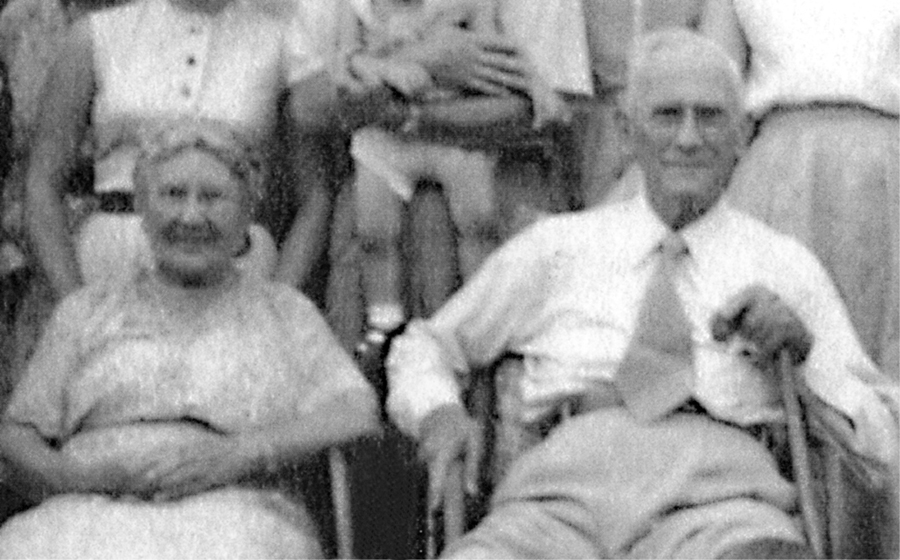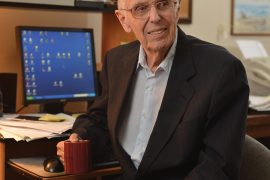Builder of skyscrapers and champion of the underprivileged
By Joseph Platania
HQ 52 | SUMMER 2004
Many local residents have seen or visited the Prichard Building on the southwest corner of Sixth Avenue and Ninth Street in downtown Huntington. Some may even remember the days when it was a hotel and a large lighted sign sat atop the 13-story structure, beckoning visitors from near and far. And while the stately tower has been a Huntington landmark since the mid-1920s, few residents know the story of the man for which the building is named.
When he died on Dec. 2, 1960, at age 89, Fred C. Prichard was described by a local newspaper as “one of the builders of Huntington.” He was responsible for the construction of two of the city’s skyscrapers — the Hotel Prichard and the Robson-Prichard Building, which was later renamed the Chafin Building and, more recently, the Arch Coal Building.
The Hotel Prichard opened formally with a banquet on July 24, 1925. The hotel boasted 300 rooms at the time, 100 of which had air conditioning. A single room charge ran anywhere from $2 to $4 a night. Luxurious suites also were available. Located one block down from the C&O passenger station, the Prichard catered to train passengers and crews. However, the hotel was never a success financially. Gibson Hotels acquired the Prichard in 1930. The hotel was remodeled in 1960 and then sold to a hotel chain in 1964. By the late 1960s, the Prichard was down to 180 guest rooms. The hotel era ended when the building was again sold on July 1, 1970. The former hostelry now is used as an office building with some apartments on the upper floors.
Fred C. Prichard was born on March 1, 1871, in Grayson, Kentucky, the son of Dr. Lewis and Belle Mead Prichard. Prichard received his education as a civil engineer at Notre Dame College in South Bend, Indiana.
Despite his education in civil engineering, Prichard embarked on a banking career in Charleston in 1889, where he started as an errand boy in the Charleston National Bank. A bit of a vagabond, he also tried his hand at a variety of occupations including stints as a grocery clerk, mine superintendent, and stockbroker. However, he did settle down long enough to marry Alice Claire Wilson of LaPort, Indiana, on Oct. 24, 1894. He eventually settled in Huntington in 1909.
George S. Wallace in his book Cabell County Annals and Families (1935) states that Prichard’s father was a very wealthy man in Charleston who came to Huntington in the first decade of the 20th century because of the city’s “booming economy.”
Wallace adds that “backed by his father’s fortune (Prichard) soon took a prominent place in the business life of the community.” With a lawyer named Robson, Prichard built the Robson-Prichard Building, which was “Huntington’s first skyscraper” when it was completed in 1909, writes Wallace. After the completion of the Robson-Prichard Building, Fred Prichard became the president of the Huntington Banking and Trust Co., which he founded. Prichard dealt largely in banking and real estate as well as some interests in coal. With other investors, he later built the Hotel Prichard.
Because he and his wife could not have children of their own, he then decided to devote much of his wealth to the cause of helping needy and orphaned children.
As early as 1924 Prichard started actively planning for a home and school for disadvantaged children. They not only would be provided with the basic necessities of life, but also a good education. The result was the three-story Prichard School that stands on a hill overlooking U.S. Route 60 near Ona. The unique building, which is still standing, was completed in 1927 at a cost of $150,000 and is a mixture of English, French and Italian architectures. Its exterior is made of stone that was quarried on the grounds.
Prichard then enlisted the help of two talented and dedicated women he met during a trip to Montreat, North Carolina. Kathleen Kennedy and Louise Ash sat down with Prichard one evening and during the course of their conversation discovered that they shared a dream of erecting a Christian home for needy children. An article in the The Cabell Record states that, “Prichard was ecstatic. He returned to Huntington to initiate his benevolent plan.”
Prichard developed a wellequipped model dairy and farm on the school’s 650 acres. In his plans, the farm was to supply the Prichard Hotel’s dining room with fresh produce, milk, butter, eggs and other agricultural products. The hotel in turn would generate income to maintain the school and to care for and educate as many of the children as possible, even through college.
Teachers were employed, and initially 25 orphaned boys and girls were taken in. Prichard and his wife adopted the first seven children, who were given the Prichard name. During the first few years of its existence, more than 50 children went through the school. The youngsters were taught about farming, the dairy business and raising poultry and cattle. The home was intended to be self-sufficient in electricity, generated by the falls of the nearby Mud River.
Two years after the Prichard School opened, the stock market crashed and the new facility’s future became uncertain. Shortly thereafter, the Hotel Prichard went under and pulled the school down with it. Losing the school was the biggest disappointment of Fred Prichard’s life. An article in The Cabell Record states he sat by the big fireplace at the school and cried while informing Kennedy and Ash that it would have to close. With his fortune gone and his dreams for the rural orphanage and school largely unfulfilled, the hotel builder and philanthropist moved to Texas. Before moving, he generously signed over all his coal and gas royalties to the school.
Soon thereafter, Prichard’s cousin, Dr. Karl Prichard, stepped in and, with the help of donations from many of his patients who had heard of the good work being done at the school, got things back on track. In 1938, the Prichard School was forced to relocate into a less spacious dwelling on Lower Creek Road in Milton. The mansion was then sold to a local lawyer. The Prichard School remained open and functioning until the fall of 1966 when it finally closed.
Today, the large skyscrapers in downtown Huntington and the small school in Ona stand as testaments to the man needy children affectionately called “Daddy Prichard,” one of the most accomplished and caring individuals in the history of Huntington.





